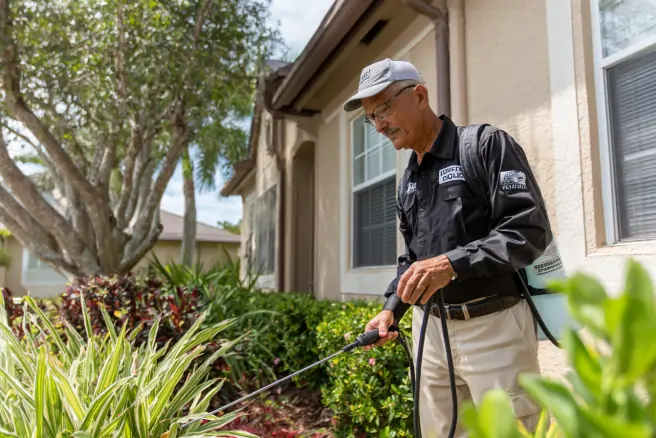 Gainesville, Florida, is famous for being home to the University of Florida. Every semester, thousands of students arrive, filling apartments, rental homes, and dorms near campus. The energy is infectious: game days at Ben Hill Griffin Stadium, late-night study sessions, and weekends spent exploring Paynes Prairie or downtown.
Gainesville, Florida, is famous for being home to the University of Florida. Every semester, thousands of students arrive, filling apartments, rental homes, and dorms near campus. The energy is infectious: game days at Ben Hill Griffin Stadium, late-night study sessions, and weekends spent exploring Paynes Prairie or downtown.
But there’s another reality to Gainesville’s college-town life: pests.
With so many students packed into older houses and apartments, pest problems often spiral quickly. For landlords and property managers, failing to control pests isn’t just an inconvenience — it’s a fast track to bad reviews, tenant turnover, and costly property damage.
A Student Rental’s Story
Take one rental home near Sorority Row. The property had been popular for years — four bedrooms, walking distance to campus, and a big porch for hanging out.
But within weeks of a new group of tenants moving in, problems started:
-
Ant trails appeared in the kitchen.
-
Roaches scattered when lights were flipped on at night.
-
Rats were heard scratching in the attic.
At first, the students tried DIY fixes: store-bought sprays, glue traps, and late-night runs to the dollar store for roach bait. But nothing worked.
Before long, complaints went online. A one-star review on a student housing forum warned others to “avoid this place — pests everywhere.” The landlord realized the issue wasn’t just bugs. It was reputation.
Why Gainesville Rentals Are High-Risk
Student rentals in Gainesville face unique pest pressures:
-
High density: Many homes near campus are shared by four or more students, increasing clutter and food waste.
-
Older housing stock: Gainesville has many historic and mid-century homes with cracks, gaps, and outdated plumbing.
-
Humidity and storms: The city’s climate fuels termites, ants, and cockroaches year-round.
-
Proximity to wooded areas: Rentals near Paynes Prairie or heavily treed neighborhoods attract rodents and ants.
-
Fast tenant turnover: Landlords may not notice problems between leases, allowing infestations to grow.
The Risks for Landlords
Ignoring pests in Gainesville rentals has consequences:
-
Health complaints: Roaches trigger asthma and allergies; rodents spread salmonella.
-
Property damage: Termites and rodents silently destroy wood, insulation, and wiring.
-
Legal exposure: Florida law requires landlords to provide habitable housing. Pests can put owners at risk of tenant disputes.
-
Reputation harm: Bad online reviews deter future tenants, especially in a student-driven market.
For landlords, investing in pest control isn’t just maintenance — it’s protecting income.
How Pest Control Solved the Problem
When the landlord of the Sorority Row rental called a Gainesville pest control company, the technicians immediately designed a targeted plan.
Step 1: Inspection
The team identified:
-
Roach nests behind the refrigerator.
-
Ant entry points near plumbing.
-
Rodent droppings in the attic.
-
Moisture damage under the bathroom sink.
Step 2: Immediate Treatments
-
Gel baits and targeted sprays for roaches.
-
Ant bait stations along the foundation.
-
Rodent traps and exclusion work in the attic.
-
Moisture treatment to reduce future infestations.
Step 3: Prevention Measures
-
Sealing gaps in baseboards and foundations.
-
Installing door sweeps and vent screens.
-
Educating tenants on proper food storage and trash handling.
Step 4: Ongoing Monitoring
Monthly visits ensured pests stayed under control, even during humid summer months.
The Turnaround
Within a month, the property was transformed. Roach sightings stopped. Ants disappeared. Rodent activity dropped to zero.
The landlord didn’t just save one lease cycle — they saved their reputation. Positive reviews began appearing, praising the clean, comfortable home.
The experience made one thing clear: in Gainesville’s competitive rental market, pest control isn’t optional. It’s part of doing business.
Broader Pest Challenges in Gainesville
While student rentals are a vivid example, pests affect every type of property in Gainesville:
-
Apartments: Shared walls and plumbing allow pests to spread quickly between units.
-
Restaurants: Downtown eateries battle roaches and rodents constantly.
-
Single-family homes: Termites and mosquitoes are the biggest threats.
No matter the property type, pests thrive in Gainesville’s humid, wooded environment.
Prevention Tips for Landlords and Homeowners
-
Schedule quarterly pest control visits: Don’t wait for infestations.
-
Seal cracks and gaps: Especially in older Gainesville homes.
-
Educate tenants or family members: Simple habits like wiping counters and closing trash bags reduce infestations.
-
Control moisture: Fix leaks and use dehumidifiers where needed.
-
Yard maintenance: Trim vegetation touching the house and reduce standing water.
These steps help homeowners and landlords stay proactive instead of reactive.
Why Local Expertise Matters
Gainesville’s pest pressures are unique. Local pest control companies understand:
-
Student rentals: How infestations spread quickly in shared housing.
-
Termite surges: Subterranean and Formosan species common to North Florida.
-
Mosquito populations: Fueled by wetlands like Paynes Prairie.
-
Older homes: Gainesville’s historic properties require careful treatment methods.
National chains may offer general services, but local pros bring the specific experience Gainesville properties need.
Final Thoughts
Pest control in Gainesville, FL, is more than a household task. It’s a community-wide necessity shaped by the city’s climate, housing stock, and student culture.
For landlords, ignoring pests risks property damage, legal disputes, and ruined reputations. For homeowners, infestations threaten health and long-term investment.
The story of the Sorority Row rental proves one thing: with professional help, even the worst pest problems can be turned around.
Because in Gainesville, the only thing crawling through a student rental should be late-night study groups — not cockroaches.